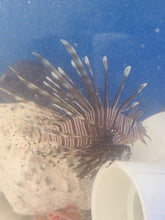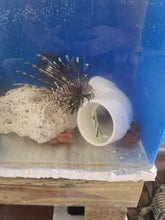The Lion fish is incredibly interesting to watch in your aquarium but it is not to friendly with the other fish and animals if not provide with enough sustenance. They will grow quickly so a tank volume over 100 gallons is recommnded and the spines are venomous so use caution working in your aquarium.
| Category | Salt Water Fish |
| Care | Easy |
| Diet | Carnivore and Generally Fed Fresh Shrimp |
| Maximum Size | Supplied as 3-5 Inches but Grows to 15 Inches |
| Origin | Florida |
| Minimum Tank Size |
120 Gallons |
| Water Condition | 72-78 F, dkh 8-12, PH 8.1-8.4, sg 1.023-1.025 |
| Water Flow | Medium |
| Light | Medium |
| Reef Compatible | With Caution |
| Compatibility | See Chart |
The Volitan Lionfish is also known as the, Common Lionfish or Red Lionfish coloration can vary depending on the age and maturity of the fish, displaying a red to burgundy, white, and brown to black vertical stripes along the length of the body. It also has large, fan-like pectoral fins, and tall, banded spines on the dorsal fin.
The spines on the dorsal, pelvic, and anal fins are venomous, and used solely for defense. If stung, the affect is similar to a bee sting, only stronger. Lionfish venom contains proteins that are broken up by heat, which prevent them from entering the bloodstream. After a sting, remove any broken spines lodged in the wound, and immediately immerse the affected area in the hottest water you can stand for 30 minutes, followed by medical attention. For individuals sensitive to stings, its advisable to seek medical attention immediately.
The Volitan Lionfish can grow rapidly to an adult size of 15 inches, and when full grown these fishes should be housed in a 120 gallon or larger aquarium with numerous hiding places. It will hide while acclimating to its new home, but then is generally found out in the open. It may eat smaller fish, shrimp, and other crustaceans in the tank.




